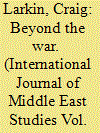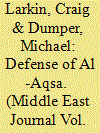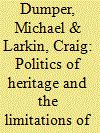| Srl | Item |
| 1 |
ID:
101169


|
|
|
|
|
| Publication |
2010.
|
| Summary/Abstract |
This article seeks to address how Lebanese youth are dealing with the legacy of civil war (1975-90), given the national backdrop of official silence, persisting injustice, and competing memory discourses. Drawing on Marianne Hirsch's concept of postmemory, it explores the memory of a generation of Lebanese who have grown up dominated not by traumatic events but by narrative accounts of events that preceded their birth. This residual form of memory carries and connects with the pain of others, suffusing temporal frames and liminal positions. The article examines how postmemory is mediated and transformed through the mnemonic lenses of visual landscapes and oral narratives. Consideration is given to the dynamic production of "memoryscapes"-memories of violence localized in particular sites-and to narrative constructions of the past implicated in the ongoing search for meaning, historical truth, and identity. This article seeks to challenge pervasive notions of Lebanese postwar amnesia and of a generational detachment from the residual effects and future implications of war recollections.
|
|
|
|
|
|
|
|
|
|
|
|
|
|
|
|
| 2 |
ID:
111226


|
|
|
|
|
| Publication |
2012.
|
| Summary/Abstract |
The past ten years have witnessed the collapse of Palestinian political authority and leadership in East Jerusalem. Evidence suggests that the Islamic Movement is beginning to fill this vacuum from within Israel. This article examines the growing involvement of the Islamic Movement of Israel in Jerusalem, both in terms of discourse and specific facts on the ground. It explores how the al-Aqsa mosque has been employed, particularly by Shaykh Ra'id Salah, as a symbol for political empowerment, a site for public contestation, and a focus for religious renewal. It debates whether their presence should be perceived as a growing strategic threat, part of an Islamizing trend, or rather as a consequence of weak local leadership, the unintended consequences of the separation wall and the non-recognition of the Hamas government.
|
|
|
|
|
|
|
|
|
|
|
|
|
|
|
|
| 3 |
ID:
117833


|
|
|
|
|
| Publication |
2012.
|
| Summary/Abstract |
This article problematises international heritage interventions in divided cities through exploring UNESCO's role in Jerusalem's Old City. It examines the tension between universal heritage values and protocols and nationalist agendas which often involve politicised archaeological responses. Drawing on comparative case studies of UNESCO-affiliated projects in Fez and Aleppo, and in the violently divided cities and regions of Mostar and Kosovo, it assesses future challenges and possibilities facing UNESCO in Jerusalem. While the article confirms an increased need for an international arbitrator and protector for the city's sacred sites and divided cultural heritage, it also underscores the limitations of UNESCO's legal remit and the political sensitivities which hinder its praxis.
|
|
|
|
|
|
|
|
|
|
|
|
|
|
|
|
| 4 |
ID:
165178


|
|
|
|
|
| Summary/Abstract |
This article examines three museums that address Lebanon’s history of conflict: the newly opened Beit Beirut on the capital’s former Green Line, the Hezbollah-run Mleeta Resistance Tourist Landmark in south Lebanon, and Umam Documentation and Research’s online archive “Memory at Work.” Each testing the parameters of what the term museum can mean in Lebanon today, these cases highlight the still-contested nature of war narratives. While many Lebanese youth express desire for a shared national history of the civil war, the affective complexities of recuperated memorial sites and the inconsistent involvement of the state suggest that the possibility of publicly staging such a history is far from secure.
|
|
|
|
|
|
|
|
|
|
|
|
|
|
|
|